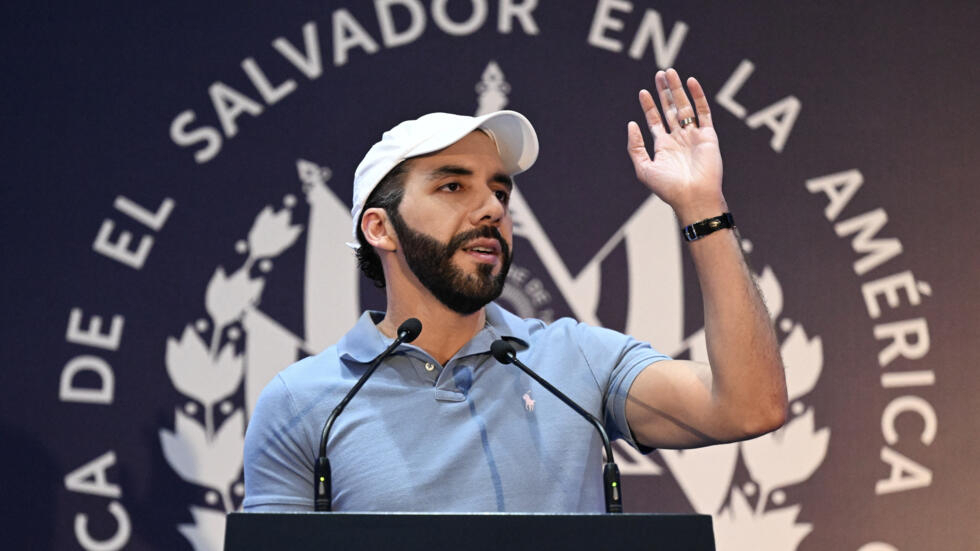
- Bukele’s success is attributed to his aggressive crackdown on gangs, which has drastically reduced crime rates in the country.
- The legislative reforms introduced under Bukele’s administration represent a significant departure from previous approaches to gang violence.
- Bukele’s second term will likely focus on addressing economic challenges, including poverty and private investment.
President Nayib Bukele of El Salvador won a landslide victory in the recent elections, securing over 83% of the vote with his New Ideas party expected to dominate the legislative body. Bukele’s success is attributed to his aggressive crackdown on gangs, which has drastically reduced crime rates in the country. Despite concerns about democratic erosion, voters have rewarded Bukele for his efforts to combat gang violence. However, some analysts caution that the mass incarceration of citizens may not be sustainable in the long run. Bukele’s second term will likely focus on addressing economic challenges, including poverty and private investment.
Bukele’s Strategy to Combat Drug Violence
In the chronicles of El Salvador’s battle against street gangs, President Nayib Bukele’s tenure stands out for its unprecedented crackdown on gang violence, particularly targeting the notorious Mara Salvatrucha (MS13) and Barrio 18 factions. Through a combination of extreme legal measures, a broad interpretation of gang affiliation, and the consolidation of political power, Bukele’s administration has embarked on a relentless campaign to dismantle gang structures and restore security. This article delves into the multifaceted dimensions of Bukele’s approach, examining its effectiveness, implications for civil liberties, and broader societal impact.
Central to Bukele’s strategy is the declaration of a state of emergency, an extraordinary measure rarely employed in response to public security threats. Initially implemented in March 2022 following a series of brutal gang massacres, the state of emergency grants unprecedented powers to security forces, including the authority to make arrests without warrants and intercept communications. This legal framework, coupled with legislative reforms increasing penalties for gang affiliation, has facilitated a surge in arrests and disrupted gang operations on multiple fronts.
The legislative reforms introduced under Bukele’s administration represent a significant departure from previous approaches to gang violence. By increasing jail sentences for gang membership and broadening the scope of anti-gang laws, the government has sought to cast a wider net, targeting not only active gang members but also aspiring recruits and suspected collaborators. While these measures have bolstered law enforcement efforts, concerns have been raised regarding due process rights and the potential for arbitrary arrests based on flimsy evidence or vague charges.
Impact of the Crackdown
The repercussions of Bukele’s crackdown extend beyond the realm of law enforcement, reshaping the dynamics of gang warfare and societal interactions. Former gang strongholds, once characterized by fear and intimidation, have experienced a palpable shift as residents reclaim public spaces and engage in community activities free from gang interference. However, lingering apprehensions about potential reprisals from released gang members underscore the complex social dynamics at play, highlighting the need for comprehensive community-based interventions to address underlying drivers of gang violence.
Beyond its immediate impact on gang structures, Bukele’s state of emergency has precipitated broader societal changes, both positive and concerning. While the decline in gang activity has been hailed as a victory for public security, questions linger about the erosion of civil liberties and the concentration of power in the hands of the executive branch. Moreover, reports of ongoing extortion and pockets of gang resistance underscore the resilience of criminal networks and the challenges inherent in sustaining long-term security gains.
Conclusion
As El Salvador grapples with the aftermath of Bukele’s unprecedented crackdown, policymakers and stakeholders must navigate a complex landscape characterized by competing priorities and entrenched social issues. Balancing the imperatives of public security with respect for human rights remains a formidable challenge, requiring a nuanced approach that addresses the root causes of gang violence while safeguarding democratic principles and the rule of law.
Bukele’s state of emergency represents a watershed moment in El Salvador’s battle against street gangs, reshaping the country’s security landscape and societal dynamics. While the crackdown has yielded tangible results in curbing gang violence, its long-term implications for civil liberties and democratic governance warrant scrutiny. As El Salvador charts its course forward, the imperative of striking a delicate balance between security imperatives and fundamental freedoms remains paramount.
References:
- https://www.nytimes.com/2024/02/04/world/americas/election-el-salvador-bukele.html
- https://www.indiatoday.in/world/story/el-salvador-president-nayib-bukele-election-winner-2497606-2024-02-05
- https://progressive.org/latest/el-salvador%E2%80%99s-president-nayib-bukele-easily-wins-abbott-20240209/
